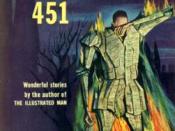Ray Bradbury's novel Fahrenheit 451 and George Orwell's 1984 are two novels with many striking parallels. They were written at nearly the same time, and because of their historical context, or perhaps the influence of Orwell upon Bradbury, had a very similar theme: the threat imposed on the individual by the state. Bradbury's work attacked censorship as a threat to our culture, but this one facet of the world he created, he delivered an equally potent warning against totalitarianism. Similarly, 1984 had an anti-totalitarian theme, although with a more detailed and overt delivery. In his afterword to 1984, Erich From noted that "it would be most unfortunate if the reader smugly interpreted 1984 as another description of Stalinist barbarism, and if he does not see that it means us, too" (267). It is in Bradbury's work that this moral is brought to life, for his is much closer to our own world than that of 1984.
Not only can totalitarianism come with oppressive ideological regimes; it can also come through the pressures of popular culture to be passive and to conform, a threat more realistic and pressing in modern-day America than the other. Mogen stated that Bradbury's satire "is not directed at authoritarianism but at a more characteristically American problem, a reductionist, materialist image of human nature and human culture reinforced through mass entertainment media" (107). Thus, Bradbury and Orwell presented two alternate paths to the same end: tyranny. However, they did not claim their visions to be inevitable; they also had hope for human civilization; their tales were tales of warning, not prediction. Because of mankind's phoenix nature, it can rise above oppression and reinvent its culture, but only if each individual actively keeps in check his or her willingness to give up basic rights for the good...


